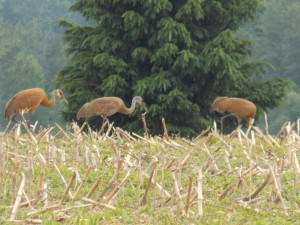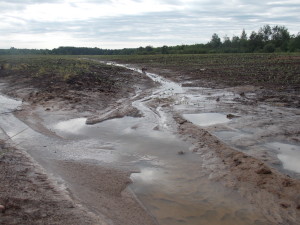We have much more to do and your continued support is needed now more than ever.
What I Learned About My Farm from Two Minutes in the Rain
Driving home one evening earlier this summer, I noticed a lot of water in roadside ditches after a sizable storm rolled through the area. I thought it would be a great opportunity to see if there were any visible differences from the farming practices I am implementing on my land. I had expected some difference, but was truly amazed at what I saw.
[youtube]http://www.youtube.com/watch?v=evV3LhBmMIs[/youtube]
Wildlife-friendly farming practices

No till and cover crops increase carbon sequestration, provide more benefits to wildlife, and reduce erosion. It was specifically that last point why I went out in the rain a few weeks back. As I made my way down the road I noticed the water running off of my field was still clear. The soil and nutrients stayed in the field. But as I crossed the road it was a rather different story which became immediately apparent. Runoff from my neighbor’s field (using conventional tillage practices) was a thick brown color, indicating considerable soil and nutrient loss—contributing to water quality issues for wildlife and downstream residents.
If I can farm profitably and also protect habitat and water quality, it seems to me a rather easy decision. Yet, not all farmers use these techniques for a multitude of reasons. There are transition barriers, but conservation programs help. I have an Environmental Quality Incentives Program (EQIP) contract through the Natural Resources Conservation Service that helps defray some of the costs of implementing nutrient management and no till practices. Most farmers would agree conservation programs provide the biggest impact in protecting resources and are well worth it for farmer and taxpayer alike.
Opportunity to protect water quality and wildlife in the Farm Bill

Voice your support for conservation in the Farm Bill
We need a farm bill that supports programs that help farmers transition to practices that conserve resources and provide multiple benefits. We also need provisions that ensure basic conservation is implemented in exchange for all farm subsidies and that subsidies do not encourage the destruction of valuable wildlife habitat. Please call your representative to ask them for a Farm Bill that includes conservation compliance reconnected to crop insurance premium subsidies, a national sodsaver provision, and more funding for conservation programs! Take action online: https://online.nwf.org/site/Advocacy?cmd=display&page=UserAction&id=1628 Better yet, with August recess upon us, meet with your representative or a staff member to discuss the value of conservation in the Farm Bill.





















